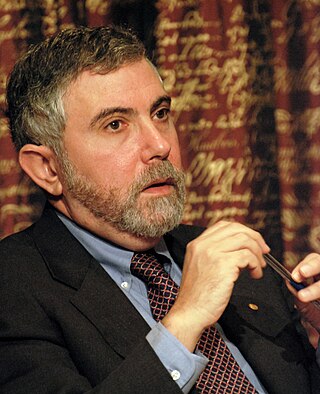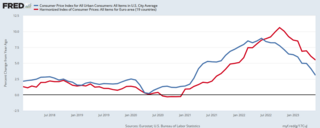The Austrian School is a heterodox school of economic thought that advocates strict adherence to methodological individualism, the concept that social phenomena result exclusively from the motivations and actions of individuals. Austrian school theorists hold that economic theory should be exclusively derived from basic principles of human action.

In economics, inflation is a general increase of the prices. This is usually measured using the consumer price index (CPI). When the general price level rises, each unit of currency buys fewer goods and services; consequently, inflation corresponds to a reduction in the purchasing power of money. The opposite of CPI inflation is deflation, a decrease in the general price level of goods and services. The common measure of inflation is the inflation rate, the annualized percentage change in a general price index. As prices faced by households do not all increase at the same rate, the consumer price index (CPI) is often used for this purpose. The employment cost index is also used for wages in the United States.
Rüdiger Dornbusch was a German economist who worked in the United States for most of his career.

The University of Massachusetts Amherst is a public land-grant research university in Amherst, Massachusetts. It is the oldest, largest, and flagship campus in the University of Massachusetts system, and was founded in 1863 as an agricultural college. It is also a member of the Five College Consortium, along with four other colleges in the Pioneer Valley.

Paul Robin Krugman is an American economist who is the Distinguished Professor of Economics at the Graduate Center of the City University of New York and a columnist for The New York Times. In 2008, Krugman was the winner of the Nobel Memorial Prize in Economic Sciences for his contributions to New Trade Theory and New Economic Geography. The Prize Committee cited Krugman's work explaining the patterns of international trade and the geographic distribution of economic activity, by examining the effects of economies of scale and of consumer preferences for diverse goods and services.
In economics, shock therapy is a group of policies intended to be implemented simultaneously in order to liberalize the economy, including liberalization of all prices, privatization, trade liberalization, and stabilization via tight monetary policies and fiscal policies. In the case of post-Communist states, it was implemented in order to transition from a command economy to a market economy.

Laura D'Andrea Tyson is an American economist and university administrator who is currently a Distinguished Professor of the Graduate School at the Haas School of Business of the University of California, Berkeley and a senior fellow at the Berggruen Institute. She served as the 16th Chair of the White House Council of Economic Advisers from 1993 to 1995 and 2nd Director of the National Economic Council from 1995 to 1996 under President Bill Clinton. Tyson was the first woman to hold each of those posts. She remains the only person to have served in both posts.

A liquidity trap is a situation, described in Keynesian economics, in which, "after the rate of interest has fallen to a certain level, liquidity preference may become virtually absolute in the sense that almost everyone prefers holding cash rather than holding a debt which yields so low a rate of interest."

In economic policy, austerity is a set of political-economic policies that aim to reduce government budget deficits through spending cuts, tax increases, or a combination of both. There are three primary types of austerity measures: higher taxes to fund spending, raising taxes while cutting spending, and lower taxes and lower government spending. Austerity measures are often used by governments that find it difficult to borrow or meet their existing obligations to pay back loans. The measures are meant to reduce the budget deficit by bringing government revenues closer to expenditures. Proponents of these measures state that this reduces the amount of borrowing required and may also demonstrate a government's fiscal discipline to creditors and credit rating agencies and make borrowing easier and cheaper as a result.

Robert Patrick Murphy is an American economist. Murphy is research assistant professor with the Free Market Institute at Texas Tech University. He has been affiliated with Laffer Associates, the Pacific Research Institute, the Institute for Energy Research (IER), the Independent Institute, the Ludwig von Mises Institute, and the Fraser Institute.

Olivier Jean Blanchard is a French economist and professor who is a senior fellow at the Peterson Institute for International Economics. He was the chief economist at the International Monetary Fund from September 1, 2008, to September 8, 2015. Blanchard was appointed to the position under the tenure of Dominique Strauss-Kahn; he was succeeded by Maurice Obstfeld. He is also a Robert M. Solow Professor of Economics emeritus at the Massachusetts Institute of Technology (MIT). According to IDEAS/RePEc, he is one of the most cited economists in the world.

Modern monetary theory or modern money theory (MMT) is a heterodox macroeconomic theory that describes currency as a public monopoly and unemployment as evidence that a currency monopolist is overly restricting the supply of the financial assets needed to pay taxes and satisfy savings desires. According to MMT, governments do not need to worry about accumulating debt since they can create new money by using fiscal policy in order to pay interest. MMT argues that the primary risk once the economy reaches full employment is inflation, which acts as the only constraint on spending. MMT also argues that inflation can be addressed by increasing taxes on everyone to reduce the spending capacity of the private sector.

Hans-Werner Sinn is a German economist who served as President of the Ifo Institute for Economic Research from 1999 to 2016. He currently serves on the German economy ministry’s advisory council. He is Professor Emeritus of Economics and Public Finance at the University of Munich.

Xue Muqiao was an eminent Chinese economist and politician. He was instrumental in introducing and implementing economic reforms that transformed China into a socialist market economy by participating in the development of the ideological concept of a primary stage of socialism.

Robin Elizabeth Wells is an American economist. She is the co-author of several economics texts, mostly with her husband Paul Krugman.
John Howland Cochrane is an American economist specializing in financial economics and macroeconomics. Formerly a professor of economics and finance at the University of Chicago, Cochrane serves full-time as the Rose-Marie and Jack Anderson Senior Fellow at the Hoover Institution at Stanford University.
Anna Nagurney is an American mathematician, economist, educator and writer in the field of Operations Management. Nagurney is the Eugene M. Isenberg Chair in Integrative Studies in the Isenberg School of Management at the University of Massachusetts Amherst in Amherst, Massachusetts. Previously, she held the John F. Smith Memorial Professorship of Operations Management at the Isenberg School of Management from 1998 to 2021.

Zhang Weiying is a Chinese economist and was head of the Guanghua School of Management, Peking University. He is known for his advocacy of free markets and his ideas have been influenced by the Austrian School.
Rent regulation is a system of laws, administered by a court or a public authority, which aims to ensure the affordability of housing and tenancies on the rental market for dwellings. Generally, a system of rent regulation involves:

A worldwide increase in inflation began in mid-2021, with many countries seeing their highest inflation rates in decades. It has been attributed to various causes, including pandemic-related economic dislocation, supply chain problems, the fiscal and monetary stimuli provided in 2020 and 2021 by governments and central banks around the world in response to the pandemic, and price gouging. Recovery in demand through 2021 ultimately led to historic and broad supply shortages amid increasing consumer demand. Worldwide construction sectors were also hit.












